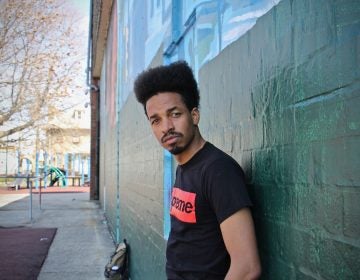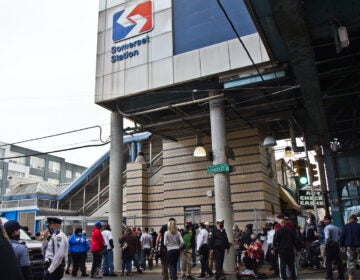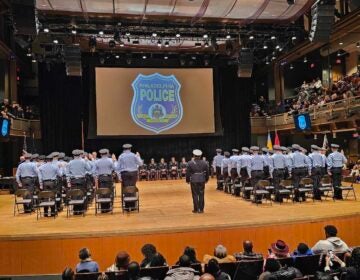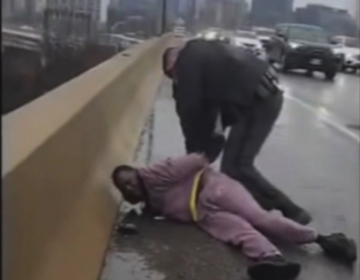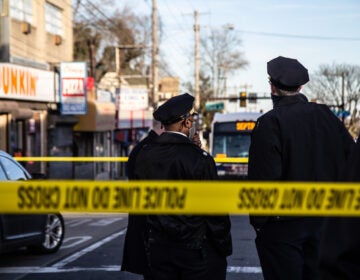Philly police chief says agency can’t fund violence prevention even as spending grows
Philly is spending more on policing now than in the past, yet PPD can’t budget for anti-violence work amid a homicide crisis, the Commissioner Outlaw said.
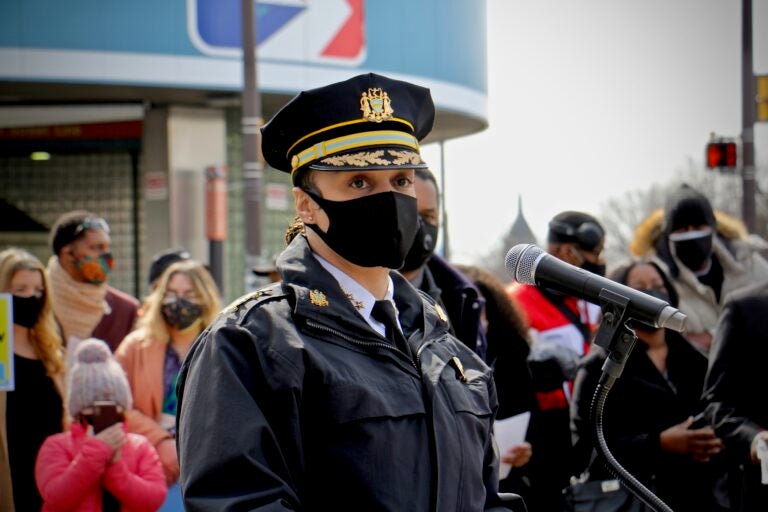
Philadelphia Police Commissioner Danielle Outlaw speaks at Olney Transportation Center, where a mass shooting occurred on Feb. 17, 2021. She joined local and state officials in calling for legislative and executive action to stop gun violence. (Emma Lee/WHYY)
Philadelphia Police Commissioner Danielle Outlaw said the department is focusing its resources on enforcement rather than prevention or violence interruption at a City Council Special Committee on Gun Violence hearing.
“We don’t have a solid strategy around interruption because we are doing what we can to make sure that we’re visible in the places that we need to be present,” she said Thursday at the virtual hearing.
Outlaw spoke to the council amid an unrelenting gun violence crisis that has taken 119 lives so far this year, according to police data, a 28% increase over a record-breaking 2020 wherein the city lost 499 victims.
She said the department wants to work with grassroots organizations that can help with mediation and other conflict resolution efforts while the law enforcement agency concentrates on traditional law enforcement.
Joel Dales, deputy police commissioner, told the City Council committee that police need the community to take a leading role in prevention and work to interrupt the cycle of violence playing out across the city.
“We can’t do this alone,” he said. “We need help.”
Despite discussion about “defunding” police departments, the PPD operating budget has grown by about 15% under Mayor Jim Kenney, from $640 million to about $725 million. But the department has likely already run up costs in excess of a city budget passed after the Minneapolis police killing of George Floyd flatlined proposed law enforcement funding increases.
The department long ago acknowledged police overtime spending had spiraled in 2020. The spending on this increased police presence, Outlaw said, was important during a year of civil unrest — which the commissioner predicted could increase following a verdict in the Derek Chauvin murder trial.
The Kenney administration further reported last October that $76 million out of $276.4 million in CARES Act pandemic relief funds from the U.S. Department of Treasury was allocated to defray personnel costs related to “public health and public safety,” which includes the Department of Public Health and paramedic costs — but also city police and prisons.
Kenney spokesperson Mike Dunn asserted the city could not yet update this figure or separate out specific costs to law enforcement but said another $2 million in CARES Act funding had been given directly to the police department, largely to cover overtime costs and the purchase of personal protective equipment or other supplies. The U.S. Department of Justice allocated another $4.8 million in supplemental funding, about $2 million of which has been spent on PPE and cleaning supplies linked to the PPD.
Councilmember Jamie Gauthier said she appreciated the police department’s work but urged Outlaw to consider prevention as part of a solution to the city’s gun violence problem. Enforcement alone won’t stop the bloodshed, she said.
“The fact that council keeps asking you questions about prevention and intervention means that we want to see a strategy, where all of these efforts are equally as important,” Gauthier said.
Councilmember Derek Green also pushed back saying that the increase of police presence hasn’t prevented the current spike in gun violence.
“What has been new is the increase in homicides in the city at a level we haven’t seen in decades,” Green said.
A recent survey by a coalition of community groups found that a large number of Philadelphia residents do not feel safe in their neighborhoods despite the police presence.
Green said he wants resources for violence interruption and prevention to be funded in the city’s upcoming budget. He said it doesn’t necessarily have to be through the police department, but money should be provided to grassroots organizations that already have established relationships with the community.
As the virtual hearing continued, panelists recommended approaching gun violence as a public health problem. Taking that approach means treating the epidemic with a complex, holistic strategy that addresses root causes as if it were a disease rather than an isolated problem that could be solved through law enforcement alone.
“I’m really a huge advocate of treating this as a public health issue because it works,” said Marla Davis-Bellamy, director of Philadelphia CeaseFire, a gun violence prevention advocacy group.
In the two years after CeaseFire began working to reduce violence in Philadelphia in 2011, 30% of shootings decreased in the 22nd police district, she said.
Davis-Bellamy sees an impact in the group’s practice of bringing affected young people to talk to others who have been in the world of gun violence. She advised not to demonize people in that life because there are multiple factors such as a lack of opportunity that typically lead people to gun violence.
“There’s nothing like a young person engaging with someone who has walked in their shoes,” she said.
Davis-Bellamy said it’s important to talk to people early. Her organization has spoken to children as young as the first grade so they know the realities.
Dr. Jessica Beard, a trauma surgeon at Temple University Hospital and School of Medicine, also called for a public health approach. She said the weekly rate of shootings doubled during the pandemic, tragically illustrating the need for a new strategy.
“This is important because what we have been doing is not working,” Beard said.

Subscribe to PlanPhilly
WHYY is your source for fact-based, in-depth journalism and information. As a nonprofit organization, we rely on financial support from readers like you. Please give today.



